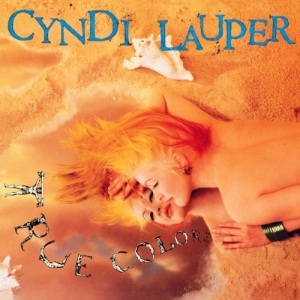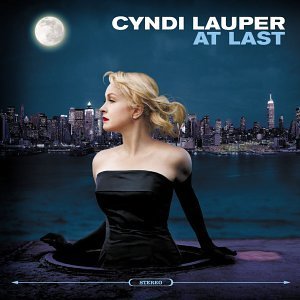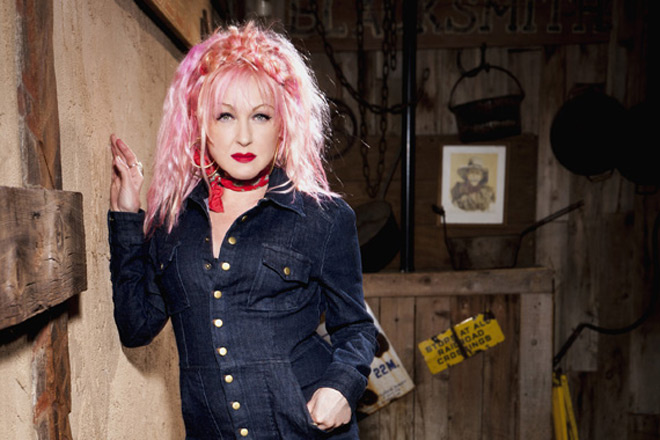Artistic expression is uncompromising, true to the creator’s vision and ability to take risks. Standing by her instincts, while expanding her horizons along the way, Pop icon Cyndi Lauper has built a career in music that has spanned over thirty years. Born and raised in the borough of Queens, New York, Cynthia Ann Stephanie “Cyndi” Lauper was magnetized to the world of music from a young age. Growing up listening to everything from The Beatles, to Billie Holiday, to Patsy Cline, Lauper would become inspired to pick up a guitar and start writing music, all before even turning 13 years old. Finding light in dark places, she pursued music further, working with various bands through the early ’70s until the formation of Blue Angel in the latter part of the decade. Attaining recognition on the New York scene, Blue Angel’s eccentric sound came together on their 1980 self-titled album, but unfortunately, the project dissolved by 1982.
Rather than take Blue Angel as a failed venture, Lauper harnessed the learning experience to take her next step forward. That step would find her trying a solo career, and in 1983 she released her debut album, She’s So Unusual. Anchored by singles such as “Girls Just Want to Have Fun” and “Time After Time,” Lauper was topping charts, all while rapidly becoming one of the biggest music stars in the world. Commercial success is all well and good, but above all, Lauper was finding her voice, style, and fulfilling her dreams of writing her own songs. An album that peaked at #4 on the US Billboard 200 Charts, it became one of the best selling records of 1984, earning Lauper six Grammy nominations.


Now internationally beloved for her unique vocals, colorful hair, and trendsetting wardrobe, Lauper wowed audiences again with 1986’s follow-up, True Colors. More than another collection of Pop songs, the record was an inward reflection, urging listeners to love themselves for who they are. Also peaking at #4 on charts, it would be the framework for Lauper’s message for years to come. So where does one go after two massively popular Pop records? The answer for Lauper was to boldly try something new, and she did just that with 1989’s A Night to Remember. Leaning into Adult Contemporary styling, the album was not nearly as commercially successful as previous work, but it proved Lauper was not merely a Pop star, but an artist who yearned for growth.
Reflecting on the past, Lauper says, “When you first become famous, it is always threatened with the same voice, ‘You’ll be ruined!’ How many times can you be ruined? You just want to be able to grow as an artist and be a great artist one day. Be a great singer, be a great writer, be great at what your craft is.” A sound piece of advice, Lauper stayed true to that sentiment as she moved forward with 1993’s topical, more Alternative sounding Hat Full of Stars, 1996’s Electronica, tingling Sisters of Avalon, 2003’s jazzy At Last, 2010’s Blues inspired Memphis Blues, and beyond.


Now selling over multi-million albums and singles, winning Grammys, Emmys, Tonys, as well as receiving a ton of other accolades, what is Lauper’s next challenge? True to her own way, she delves into Country Rock on her 11th studio album, Detour. Released back on May 6, 2016, all the chosen tracks hold a place in Lauper’s heart, and she says, “After a while, it doesn’t matter all the stuff you are told about what success really is. You want to leave something that, if it is the last thing you do, it is remembered well.” Certainly true, the 12 track record features a collection of Country covers from the ’40s, ’50s, and ’60s, all of which Lauper does a fine job of representing. Brought forth in her own light, there are also a list of special guests helping her bring the music to life, including Emmylou Harris, Willie Nelson, Vince Gill, Alison Krauss, and Jewel.
Taking a great deal of pride in what she creates, with integrity, Lauper simply does not mail it in with Detour. She gives it her all and then some. When asked about her preparation, she stated, “As you get older, you just keep growing, you don’t stop growing. I still take vocal lessons three times a week. I look at my life work as evolving, always constantly evolving.” Evolving is important, and Lauper does so with grace on Detour, all while she offers a unique take on old songs with her voice sounding strong. She says, “As a singer, we are like athletes, and if you don’t keep yourself in an athletic form, it will be more difficult to sing. Because athletically, you need to be strong. Strong body, strong voice. Roddy Piper used to tell me ‘Strong core, strong limbs.’ It is the same with your voice. If you have a guitar and you don’t take good care of it, it is not going to sound good after a while. This is the same.”
Debuting at #4 on the Billboard Top Country Albums chart, Detour broke into the Billboard 200 at position 29. Quite impressive for an artist’s first try at Country. Sure, many may have been first attracted to the record out of curiosity, but upon listening, they will soon hear this is not just a novelty. Detour is a sincere exploration, one that offers all-time classics to a new generation. Speaking of generations, and people in general, Lauper says (about being a musician), “You are in the field of humanity, you want to add and contribute if you can. That has always been my intention, I do the best I can. I can’t compare myself to frigging great people. I can only do as well as I can do and try my hardest.” That she does, and her candid confessions are inspiring as she adds, “Some days you are fantastic, or you think you are (laughs). Some days, you stink. You try to keep the stink part down to a low minimum and keep an even keel and take your best step forward. Forward is a very important thing.“

All this said, what can aspiring musicians or anyone for that matter take from Lauper? With conviction, she explains, “It is important if other artists read this so that they understand that there is a road, each road is going to be your own. You have to make your own path. That will be the hardest thing because you won’t be like other people, and you think you should be.“ Comparing oneself to others is a trap everyone falls into, and Lauper admits, “I always had a problem with myself because I wasn’t like Madonna, I wasn’t like Prince. My career didn’t take off the same way as Billy Joel. That never happened like that, I had my own road.”
Now, at 63 years of age, Lauper has offered the world a great deal of inspiration. Inspiration of free expression, individualism, and hope. Hope to make one’s dreams come true. Whether it be as a musician or not, Lauper wants everyone to know, “If you stay the course, you will get there. Have hope and faith in yourself.“








No comment